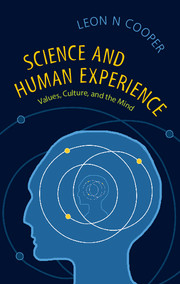Book contents
- Frontmatter
- Dedication
- Contents
- Preface
- Acknowledgement
- Part One Science and Society
- Part Two Thought and Consciousness
- 13 Source and Limits of Human Intellect
- 14 Neural Networks
- 15 Thought and Mental Experience: The Turing Test
- 16 Mind as Machine: Will We Rubbish Human Experience?
- 17 Memories and Memory: A Physicist's Approach to the Brain
- 18 On the Problem of Consciousness
- Part Three On the Nature and Limits of Science
- References
17 - Memories and Memory: A Physicist's Approach to the Brain
from Part Two - Thought and Consciousness
Published online by Cambridge University Press: 05 November 2014
- Frontmatter
- Dedication
- Contents
- Preface
- Acknowledgement
- Part One Science and Society
- Part Two Thought and Consciousness
- 13 Source and Limits of Human Intellect
- 14 Neural Networks
- 15 Thought and Mental Experience: The Turing Test
- 16 Mind as Machine: Will We Rubbish Human Experience?
- 17 Memories and Memory: A Physicist's Approach to the Brain
- 18 On the Problem of Consciousness
- Part Three On the Nature and Limits of Science
- References
Summary
It is remarkable how little we need to know about ourselves in order to survive and reproduce. Humans are probably the only animals that have made conjectures about what goes on inside the body. And even then, it has taken a long time to arrive at a clue.
This essay is based on an article originally published in the International Journal of Physics, A, 15(26), in 2000.
It was less than four hundred years ago that Harvey taught us that the heart was a pump. The great Aristotle had conjectured that the heart was the seat of intellect, reserving for the brain the function of a cooling system, which (in addition to some other functions of more than minor interest) it is. In dealing with questions about our own nature we have to survive ideology – endless discussions about organic versus inorganic, vital versus non-vital, living versus non-living. These hotly disputed questions quietly fade away when the cool light of patient investigation and hard thought finally provide illumination. Today we are engaged in the quest of understanding our brain. When we have finally worked out the details, this remarkable organ, for all of its lofty pretensions – seat of intellect, home of the soul – will very likely join other remarkable pieces of biological machinery. Remarkable, certainly, but not mysterious or possessed of any supernatural qualities.
How then do we go about trying to understand a system as complex as the brain? Obviously we cannot just make observations.
- Type
- Chapter
- Information
- Science and Human ExperienceValues, Culture, and the Mind, pp. 132 - 147Publisher: Cambridge University PressPrint publication year: 2014

